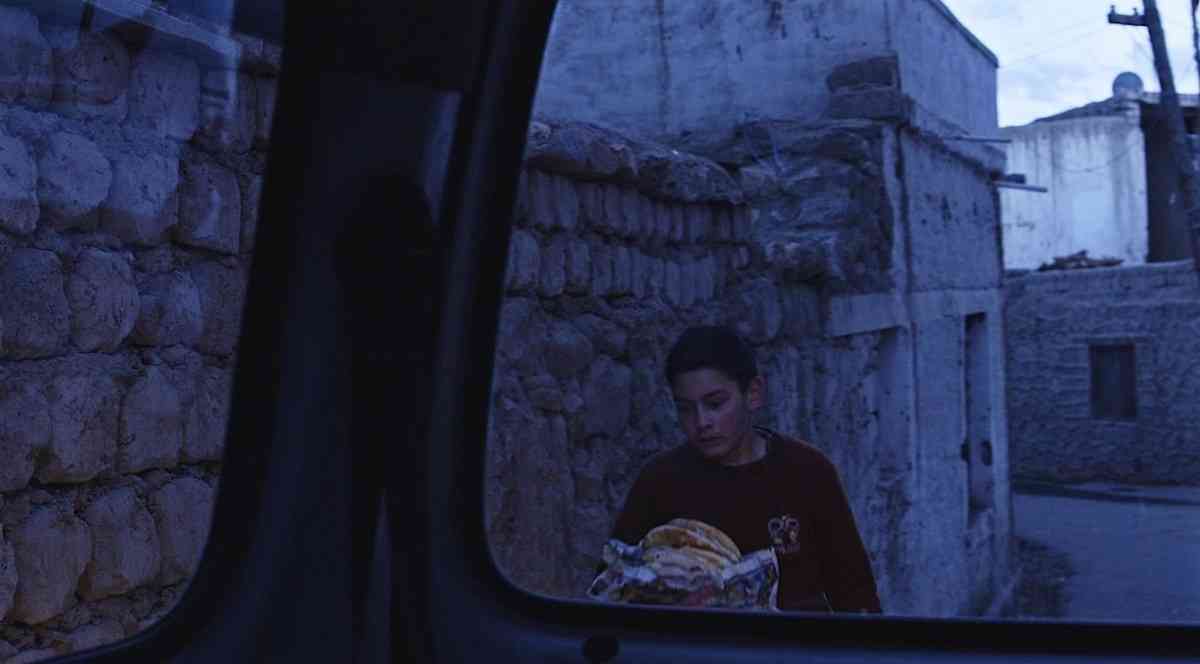Maisam Ali’s debut film, In Retreat, follows a lone protagonist as he returns to his homeland of Ladakh after many years away. The man, played by Harish Khanna, wanders through the mountain capital city of Leh over a single night, seemingly searching to reconnect with a place that was once familiar. Yet the passage of time appears to have alienated him, leaving an air of inscrutability around both his motivations and experiences.
As viewers, we learn he has returned too late to attend his brother’s funeral. Slowly drifting through crowded streets and empty prayer halls, Khanna portrays a deep loneliness through subtle expressions and weary mannerisms. His character conveys more of the weight of sadness in a look than any dialogue could. Ali’s camera follows in a meandering style, reflecting the man’s restless movements, and we begin to perceive the film as a meditative exploration of homecoming, loss, and belonging.
Despite finding a few passing interactions, the character remains always on the peripheral. Flitting among chance encounters but never fully engaging, he seems to float as an observer through a city that was once an anchoring force in his identity. Now it appears to hold only bittersweet memories, and leaving this place behind without closure has left its mark. As night falls with the end of his journey, fundamental questions linger about whether true belonging can be reclaimed and what it means to make a home within or outside of oneself.
Rendering the Everyday
Director Maisam Ali takes an unconventional view of Ladakh in In Retreat. Rather than showcase majestic mountains and sweeping vistas, the landscapes sit more in the background. Ali opts instead to zoom in on life’s simple details through nuanced visual and audio choices.
Ashok Meena’s camera whispers through narrow alleyways and quiet rooms, capturing moments that feel voyeuristic. Scenes play out with a realist sense of anonymity, as though we’ve stumbled into other people’s worlds. His lens breathes in the crowded energy of streets and marketplaces just as readily as the lonely stillness of an empty field.
Complementing this are the understated soundscapes. Outside noises blend together seamlessly, from the cacophony of a cafe to indistinct snippets of prayer. Subtle production elements like this construct an intimate sense of place felt beyond what’s on screen.
Ali also draws from his own Ladakhi experiences to flesh out the setting. Mundane rituals and local flavor abound, from Buddhist thangka paintings to momos shared around a hearth. Even brief sequences, like a girl’s doodling, take on depth through these authentic cultural threads.
Editing lends the work an organic, almost melancholic flow. Scenes unfold with a contemplative rhythm instead of a rigid structure. Connective tissue forms more from feeling than plot, prioritizing pensive inner journeys over dramatic beats.
Through these stylings, Ali fashions Ladakh as a place of routine and familiar rhythms. His deft technical approach elevates the everyday to capture complex emotions simmering just beneath social interactions and scenic backdrops.
Escaping Words
At the center of In Retreat lies Harish Khanna’s subtle yet powerful portrayal of the journying protagonist. With Ali allowing few words to define this man, Khanna fills the role through his commanding presence and nuanced gestures.
This is a performance that speaks volumes in silence. Tension pulls at weathered features, and sorrow weighs heavy in downcast eyes. Even in repose, Khanna imbues a hidden turbulence just beneath the surface. It’s as if a lifetime of experiences and regret have carved themselves into his face.
We learn scraps of backstory not through exposition but through observation. Loneliness emanates from a slight shrug or distant gaze. Discomfort in social settings comes across in fidgets and hesitation. Through these tiny authentic details, Khanna brings an enigmatic stranger to emotive life.
Interactions hold as much subtext as dialogue. Raised eyebrows and restrained reactions give glimpses into this man’s turbulent yet contained emotions. Khanna excels at portraying an inner world rich in complexity, even as his character keeps others at arm’s length.
Ali offers no context in which to easily define or understand the protagonist. Yet through subtle mastery of body language and nuanced glances, Khanna grants viewers a window into one man’s profound isolation. He proves that with a gifted performance, far less than words can resonate deeply. Khanna’s abilities breathe heart into Ali’s vision, where understanding evolves from quiet inference rather than overt explanation.
Khanna’s immense skills shine through in how fully he disappears into the role. This is a journey crafted through gesture as much as motion, eliciting deep empathy without a single line being delivered.
Belonging in Question
Maisam Ali crafts In Retreat as a perceptive meditation on finding—or losing—a sense of home. His aimless protagonist embarks on a journey that questions whether belonging can be reclaimed after years away.
The man returns to Ladakh too late, lingering at the edge of a family he left behind. Past decisions that severed roots now haunt what was once familiar and made foreign. Ali shows how time and estrangement can alienate one as much from a place as people.
Subtle details reveal the man suspended between attachment to memory and discomfort in his present reality. Reluctance to fully reimmerse hints at resignation that what was can’t be again. Yet a need for closure keeps him drifting through Leh’s streets, now inhabited by ghosts of his past.
Ali poses difficult queries through this insistent outsider. Can new growth replace what was pruned? Do attachments bind somewhere, or solely to who we were there? His thoughtful crafting finds no easy resolutions, respecting life’s messy contradictions.
The film suggests wounds of willful disconnect run deep. No interaction fully closes the man’s self-imposed distance—not friendly exchanges nor awkward reunions. Ali leaves open whether a permanent exile was chosen or a loss of place was internalized so completely that home may only ever be remembered.
With empathy and insight, In Retreat explores how shattering personal bonds shifts one to the fringes, making belonging conditional on acceptance by others or within oneself. It finds poignancy in lives unmoored yet tethered by longing to disappear into past moments that can no longer be claimed.
Non-Linear Journey
Rather than tell its tale through a straightforward plot, In Retreat opts for a looser, more poetic form. Ali structures the film as a collection of loosely linked moments that capture one man’s wandering spirit.
We follow the protagonist as he drifts between brief encounters in Ladakh. Some scenes show just a snippet of conversation over tea; others show a chance meeting in the night. Individual threads start and stop, giving the overall journey a fragmentary feel.
Yet through careful placement, Ali draws connective threads between each piece. Repeating motifs, like the girl’s doodles, subtly reference the overarching themes of separation and belonging.
Moments where one character’s solitude overlaps another’s find an intuitive rhythm. Snatches of poetry provide philosophical bookends, reflecting on life from various angles.
This non-linear approach echoes the rootlessness of the protagonist himself. Like him, we’re never quite sure what each new person or place may reveal. The scattered vignettes invite us to fill in the gaps, empathizing with lives in flux.
Ali’s technique mirrors the messy contradictions of experience. Fragmented though it seems,In Retreat’s structure ultimately brings us fully inside its wandering spirit’s reflective state of mind and search for completeness in an incomplete world.
Finding Meaning in Wandering
Ali’s In Retreat reveals depth beyond its plot through poetic touches and philosophical themes. His inclusion of Mahmoud Darwish’s work lends symbolic weight.
The poem, recited over one character’s journey, transforms a personal odyssey into something universal. Its lines of being “another” overlap the protagonist’s displaced air as he interacts without fully connecting.
Ali suggests this man’s alienation reflects exile in a deeper sense. By sharing Darwish’s verse detailing the experience of a Palestinian, the director places individual struggles against a backdrop of humanity unmoored.
Brief moments, like conversations with elders, also impart insight. Their recollections of past generations hint that transience and feelings of not belonging are part of the shared human experience.
While following one man adrift, the film unfurls contemplations on life through shared wisdom. It reflects on our constant search for meaning and place, whether within relationships or larger circles of belonging like community or cause.
With poetic touches and philosophical subtext, Ali lifts In Retreat above a straightforward drama. His vision highlights how personal wandering may act as a prism for examining the boundless questions and realities that connect all people, in Ladakh or beyond.
Wanderers Who can’t Find Rest
In retreat, one is reminded that one is not alone in grappling with transience and a lack of belonging. Ali’s film connects to the work of Tsai Ming-liang in its atmosphere of lingering rootlessness.
Much like the Walker series and its non-actor Lee Kang-sheng, In Retreat’s protagonist drifts endlessly in a melancholic haze. Both figures wander scenic landscapes as outsiders, pausing in brief interactions but never allowing close connections.
There is a rhythm to their rootlessness, a resignation to perpetual motion. Scenes show them perambulating at a removed, pensive pace, completely at odds with their surroundings, which are bursting with life.
Yet their detachment comes from internal struggles, not disinterest in engaging. Family bitterness and unwillingness to face what’s left behind drive In Retreat’s man, just as the monk’s motives remain mysterious.
By illuminating qualities shared between works, we find harmony in scenes depicting alienation differently. These filmmakers recognize disconnection as a universal thread in the human tapestry, part of our complex push-pull between stasis and change.
In the end, both In Retreat and Walker remind us that even those who can’t find rest continue impacting others through their quiet, ripple-making presence.
Farewells That Never Quite Happen
Retreat takes us on a poignant journey through displacement and longing. Ali’s protagonist slowly makes his way back to Ladakh, drifting among fleeting interactions yet never fully arriving.
This motif reflects the film’s meditation on belonging. Through spare vignettes, it conveys how family bitterness and unwillingness to face the past keep its man perpetually apart, lingering at a distance even in his hometown.
Khanna imbues the role with quiet complexity, communicating much through silence and subtle looks of disconnection. We feel the turmoil of his refusal to truly embrace what calls him back or move forward into new ties.
In beautiful, atmospheric imagery, Ali portrays a wanderer lost in cyclic motion, resigning himself to perpetual outsider status. The director finds profundity in the everyday sights of a culturally rich region, elevating a small story into something symbolic.
With poetry and philosophical asides, In Retreat suggests homecoming and farewell are not simple or definitive acts. Ali leaves us contemplating how fragmentation and nostalgia can prevent closure, keeping those who left in a sense always departing.
His debut offers a resonating reminder that home is as much a state of being as it is a physical place.
The Review
In Retreat
In Retreat is a thoughtfully crafted ode to disconnection and the struggle to find meaning in an unsettled existence. Maisam Ali's introspective drama crafts an atmosphere of quiet lingering through its visuals and nomadic protagonist. While subtle and ambling in pace, the film packs philosophical weight in its examination of nostalgia, belonging, and our perpetual search for completeness. Harish Khanna imbues his role with understated complexity, and Ali finds poetry in everyday Ladakh. While not for those seeking a straightforward plot, In Retreat offers rewards for those who surrender to its reflective spirit.
PROS
- Gorgeous cinematography that captures the landscapes and culture of Ladakh
- Strong performances, especially from lead actor Harish Khanna
- Thought-provoking themes of displacement, nostalgia, and the elusiveness of home
- A poetic and subtly philosophical approach to storytelling
CONS
- A slow and contemplative pace may frustrate some viewers.
- The plot is obscure and ambiguous at times.
- Minimal character development or backstories

















































